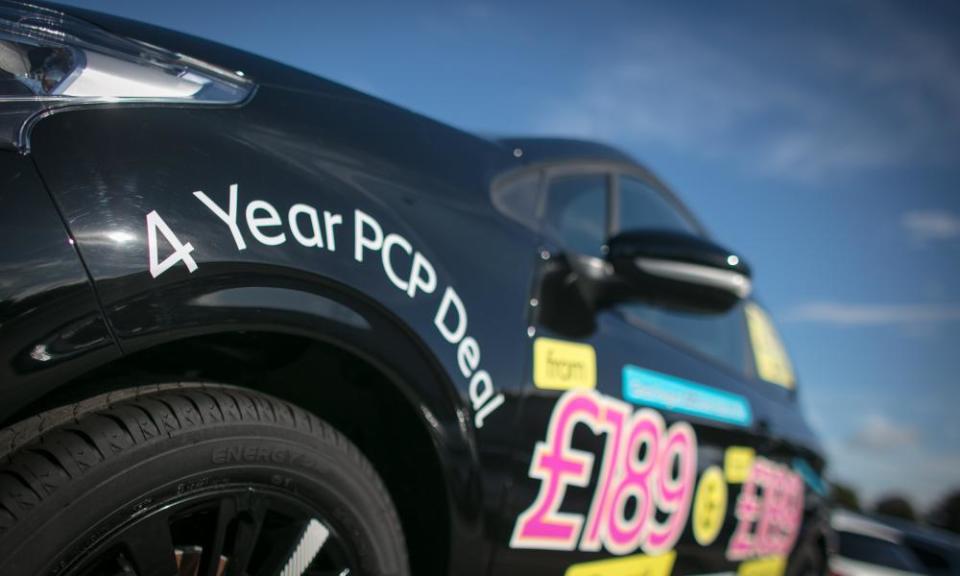What you need to know about car loans

There has been a significant increase in the number of new cars on Britain’s streets in the last three to four years, with vehicle registrations increasing to a record high of 2.7m in 2016.
Behind the boom is a new finance leasing product – a personal contract plan – that means the driver never owns the car, but only pays a small deposit and interest payments to cover the depreciation of the car over three to five years. At the end of the contract, they then have the option of making a “balloon payment” in order to keep the car or to hand back the vehicle at no cost.
There is concern at the Bank of England that lending for car purchases – already at £58bn – is entering risk territory. Three of the Bank’s regional agents said recently in a blog: “Car manufacturers and their finance houses are increasingly stimulating private demand by offering cheaper (and new) forms of car finance. The industry continues to accumulate credit risk, predicated on the belief that used car values will remain robust.”
Here we are answer key questions about car loans.
How do people buy cars in Britain?
Ten years ago the majority of new cars were bought with cash or a deposit and a loan from the bank. The aim was to own the car outright immediately or after at least five years. Since the financial crash, the car companies and the banks have developed a model of car leasing for retail customers – known as personal contract plans (PCPs) – that allows for only a small deposit and then a monthly payment that covers the depreciation on the car coupled with an interest rate charge.
How big have PCP purchases become?
The size of the market is huge. About 86% of all new private cars were bought on credit in 2016, using £41bn of loans with PCPs playing a prominent role. Between 2011 and 2016 the car leasing industry expanded at an average rate of 13% a year. It means that high street dealerships depend for almost all their sales on them and so do a growing band of online car leasing firms.
Why are they so popular?
Millions of people who drive cars would love to own the latest model, but can’t afford the up-front costs. The low deposits on PCP deals are a big attraction to people with only small savings. Some analysts have calculated that the average payout on a complaint about payment protection insurance is enough to provide a deposit and several monthly payments on a new car under most PCP deals.
The monthly costs are also kept low because the customer only borrows the amount that a car depreciates, rather than borrowing enough to buy the whole value of the car. So a £50,000 Land Rover may be worth £30,000 after three years, which means the plan covers the £20,000 depreciation. In this way, the risk of a car maintaining its value after three years is passed to the leasing firm and ultimately the car company, which has shouldered the risk of a slump in secondhand car values.
How does the industry provide such low-cost loans?
It says developments in technology have allowed it to accurately calculate depreciation values and therefore provide comfort to the car companies that are taking the risk of a shortfall when the deal concludes. The secondhand car market is vast and the metrics used by the industry show exactly how much customers will pay for specific secondhand cars.
Why are politicians concerned about the rise of PCPs?
Labour MP Rachel Reeves, the chair of the business select committee, worries that the industry has proved successful in a period of near full employment and low interest rates, which may not last. When consumers borrow to buy something they become more sensitive to changes in interest rates. They also become more vulnerable to changes in their personal finances because a drop in income can lead to default on monthly payments.
Low wages growth and higher bills from council tax and heating costs have left millions of families with little choice but to borrow to buy essential appliances, furniture and a car.
If drivers own their cars outright then an increase interest rates or the loss of their job will not prevent them keeping the car, which can be vital for finding another job. If they are borrowing to maintain a car, then unemployment could result in their car being repossessed.
Misselling is another concern. The financial regulator, the Financial Conduct Authority, is currently reviewing whether to investigate the car leasing market for underhand practices and obscure clauses that disguise the real cost of borrowing.
Few customers realise they are paying 7% interest on PCP loans in many cases and could find cheaper credit to finance a car loan. For instance, they could halve that cost to 3.5% on an ordinary unsecured bank loan from half a dozen high street lenders. When the car is handed back after three years for resale, some customers have complained of being hit with charges for damage to the car or wear and tear that they thought were covered by the monthly payments and servicing. The suspicion is that car leasing firms are seeking ways to make extra profits from unsuspecting customers.

 Yahoo Finance
Yahoo Finance 